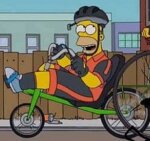e-Bikes – Let’s talk
Our Community › Forums › Commuters › e-Bikes – Let’s talk
- This topic has 1,364 replies, 117 voices, and was last updated 6 months, 4 weeks ago by
Max Silverstone.
-
CreatorTopic
-
June 21, 2011 at 7:12 pm #910062
eBikeDude
ParticipantI see a number of pros and cons to e-bikes, and I’d like to get a conversation going on that topic. Any other e-Bike users out there? What do you like about it? Anyone with concerns about e-Bikes? Let’s hear from you too! Please be nice, though!
-
CreatorTopic
-
AuthorReplies
-
September 15, 2017 at 1:23 am #1075650
sjclaeys
ParticipantElsewhere on the Forum there was a lot of consternation about a gasoline power-assisted bike on the MVT. However, it seems that a lot of the arguments made about e-bikes would also apply to this bike. What’s the difference?
September 15, 2017 at 3:21 am #1075652TwoWheelsDC
Participant@sjclaeys 165308 wrote:
Elsewhere on the Forum there was a lot of consternation about a gasoline power-assisted bike on the MVT. However, it seems that a lot of the arguments made about e-bikes would also apply to this bike. What’s the difference?
Such a bike would be legally classified as a moped due to the gasoline motor, and mopeds are prohibited on trails per Virginia code (although seemingly by exclusion in the pertinent statute, which explicitly allows e-bikes, BTW.) Mopeds are also barred from sidewalks.
September 15, 2017 at 11:05 am #1075696Harry Meatmotor
Participant@TwoWheelsDC 165310 wrote:
Such a bike would be legally classified as a moped due to the gasoline motor, and mopeds are prohibited on trails per Virginia code (although seemingly by exclusion in the pertinent statute, which explicitly allows e-bikes, BTW.) Mopeds are also barred from sidewalks.
perhaps sjclaeys was making a normative statement?
September 15, 2017 at 12:32 pm #1075701huskerdont
Participant@mstone 165299 wrote:
There! Can’t we all just unify around making fun of triathletes and end this bikering over ebikes?
Rule 42 has always been my favorite rule to break.
September 15, 2017 at 1:13 pm #1075703TwoWheelsDC
Participant@Harry Meatmotor 165319 wrote:
perhaps sjclaeys was making a normative statement?
How is the question he asked a normative statement? A normative statement would be: The biking community should embrace e-bikes and direct its energy toward getting safe and consistent standards enshrined into law and adopted by manufacturers.
Reading between the lines, he seemed to be suggesting that the pro e-bike argument is not valid or at least inconsistent because some drew a seemingly arbitrary distinction between “good” motors (electric) and “bad” motors (gas) on bikes when complaining about the gas-powered bike. But the distinctions between these types of bikes are pretty clearly delineated in the law, so there is no inconsistency.
September 15, 2017 at 1:31 pm #1075705 bentbike33Participant
bentbike33Participant@TwoWheelsDC 165327 wrote:
Reading between the lines, he seemed to be suggesting that the pro e-bike argument is not valid or at least inconsistent because some drew a seemingly arbitrary distinction between “good” motors (electric) and “bad” motors (gas) on bikes when complaining about the gas-powered bike. But the distinctions between these types of bikes are pretty clearly delineated in the law, so there is no inconsistency.
Unless the statutes are inconsistent with the laws of physics.
September 15, 2017 at 1:36 pm #1075706TwoWheelsDC
Participant@bentbike33 165329 wrote:
Unless the statutes are inconsistent with the laws of physics.
I don’t quite understand…
September 15, 2017 at 1:41 pm #1075708 bentbike33Participant
bentbike33Participant@TwoWheelsDC 165330 wrote:
I don’t quite understand…
Do the statutes treat machines of like weight and power output differently based on fuel source (gas v. electricity)?
September 15, 2017 at 2:03 pm #1075712 lordofthemarkParticipantbentbike33;165332 wrote:do the statutes treat machines of like weight and power output but different noise and stinkiness differently based on fuel source (gas v. Electricity)?
lordofthemarkParticipantbentbike33;165332 wrote:do the statutes treat machines of like weight and power output but different noise and stinkiness differently based on fuel source (gas v. Electricity)?ftfy
September 15, 2017 at 2:24 pm #1075713TwoWheelsDC
Participant@bentbike33 165332 wrote:
Do the statutes treat machines of like weight and power output differently based on fuel source (gas v. electricity)?
The statutes make a few distinctions when referencing pedal assisted vehicles:
1)If it’s gas powered, it’s a moped (assuming it’s fewer than 50cc)
2)If it has an electric motor greater than 1kw, it’s a moped
3)If it has an electric motor producing fewer than 1000w, it’s an “electric power-assisted bicycle” (e-bike)So to your question, there is a degree to which the statutes seem to treat these vehicles of like weight and power differently solely based on fuel source, in the sense that no definition of a bicycle allows for gasoline power. Your average weed whacker motor is going to put out pretty close to 1kw, so I think the assumption baked into the law is that any gas-powered motor is close enough to the 1kw threshold, so it’s just simpler to move them straight into the moped category. Of course, there are also the issues of smoke and noise that probably factor in to that classification.
September 15, 2017 at 2:42 pm #1075716dasgeh
Participant@TwoWheelsDC 165327 wrote:
Reading between the lines, he seemed to be suggesting that the pro e-bike argument is not valid or at least inconsistent because some drew a seemingly arbitrary distinction between “good” motors (electric) and “bad” motors (gas) on bikes when complaining about the gas-powered bike. But the distinctions between these types of bikes are pretty clearly delineated in the law, so there is no inconsistency.
And there is good reason for the difference. I’ve been thinking about this a lot in the context of updating the bike element. Battery powered mobility assist devices — ebikes, along with hoverboards, e-skateboards, those one-wheeled things, segways, and whatever they think of next — expand the population that is able and willing to use active transportation to get around. They expand the reach of bus and rail without the need for car parking. Communities should embrace such things. From that list, ebikes and segways need the most storage when not in use, but it’s still pretty small.
Once you add an internal combustion engine, you add noise and exhaust, as well as at least some weight. Moreover, I believe that internal combustion engines are more dangerous in a crash, not least because they could spill gasoline. (Of course, I’ve carried a can of gas on my bike to help a friend out, so maybe that’s not a deciding factor). Thus, I think it’s fair to limit these mobility assist devices to those that are battery powered.
September 15, 2017 at 4:33 pm #1075730hozn
ParticipantI think distinguishing between good motors and bad motors is far more tenuous than motor and no motor when it comes to what should be allowed on the trail. I don’t see any practical difference between low-power mopeds and e-bikes.
I’m not sure that either should be forbidden, to be clear. Though we really have pretty scarce multi-use trail resources. Can we just ban the pedestrians? Then I think most of the concerns go away.
Unrelatedly, do these various VA definitions cited apply to classification of vehicles on roadways or on trail systems? I.e. an e-bike is a motorized vehicle if you actually just take the words literally. So, for example, is NVRPA actually beholden to VA definitions of “motorized vehicles” that apply to licensing and street legality or are they allowed to interpret that literally when they forbid such vehicles on their trails?
September 15, 2017 at 5:04 pm #1075731TwoWheelsDC
Participant@hozn 165355 wrote:
Unrelatedly, do these various VA definitions cited apply to classification of vehicles on roadways or on trail systems? I.e. an e-bike is a motorized vehicle if you actually just take the words literally. So, for example, is NVRPA actually beholden to VA definitions of “motorized vehicles” that apply to licensing and street legality or are they allowed to interpret that literally when they forbid such vehicles on their trails?
VA law does allow for local jurisdictions to place additional restrictions on vehicle use, so this is tricky and reading through Arlington’s statutes, I can’t really tell what the answer is. I assume that since the state has certain definitions of what motor vehicles and e-bikes are, those rule out and a local ordinance would need to be explicit about what vehicles are prohibited and what are not if they restrict further than the state statute…but that’s just my guess.
Arlington’s MUP statute, for example, could essentially go either way, depending on what the answer to your question is. It essentially says “only bikes, no other vehicles”, but then it defines “vehicle” as “any motorized vehicle.” But according to Virginia law, an e-bike is NOT a “motorized vehicle.” I think Fairfax County just prohibits “motorized vehicles,” so I assume the state definition would be the guideline.
September 15, 2017 at 5:21 pm #1075734TwoWheelsDC
Participant@TwoWheelsDC 165356 wrote:
VA law does allow for local jurisdictions to place additional restrictions on vehicle use, so this is tricky and reading through Arlington’s statutes, I can’t really tell what the answer is. I assume that since the state has certain definitions of what motor vehicles and e-bikes are, those rule out and a local ordinance would need to be explicit about what vehicles are prohibited and what are not if they restrict further than the state statute…but that’s just my guess.
Arlington’s MUP statute, for example, could essentially go either way, depending on what the answer to your question is. It essentially says “only bikes, no other vehicles”, but then it defines “vehicle” as “any motorized vehicle.” But according to Virginia law, an e-bike is NOT a “motorized vehicle.” I think Fairfax County just prohibits “motorized vehicles,” so I assume the state definition would be the guideline.
Okay, looking at it closer, it seems the Arlington language actually is actually somewhat more clear about this, in favor of allowing e-bikes on trails. According to Arlington Code § 14.2-1.1. Definitions:
A. The words and terms defined in § 46.2-100, Code of Virginia, shall, when used in this chapter, have the meanings respectively ascribed to them in such section, unless the context clearly indicates otherwise.
To me, this means that when Arlington says “motorized vehicle”, it’s using Virginia’s definition, which excludes e-bikes. In addition, Virginia code only considers bikes and e-bikes “vehicles” when operated on the highway. When VA § 46.2-100 refers to bikes and e-bikes, it calls them “devices,” but mopeds are called “vehicles.” Thus, an e-bike is not a “vehicle” for the purposes of the Arlington MUP statute and probably not for any other local ordinance unless it is very explicit.
September 15, 2017 at 5:36 pm #1075739 -
AuthorReplies
- You must be logged in to reply to this topic.